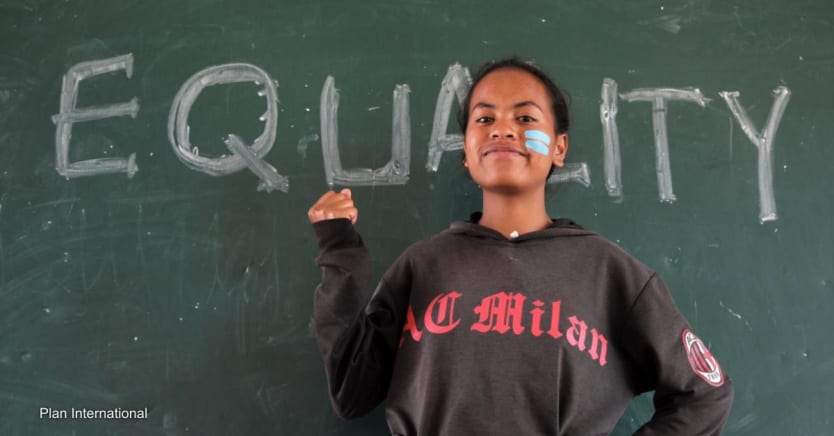
Gender equality has been fought for, for decades. However, despite our many admirable wins, progress seems to be stagnating.
Acknowledging the disproportionate impact of today’s problems on girls and women is an important start. Poverty, access to education, and decision-making power for our future are all areas where women and girls systematically fall behind.
This is only part of the picture, though. Girls and women are powerful agents of change, transforming our families, communities, and societies daily. We are often at the forefront of the fight against the climate crisis, of the improvement of essential services such as health care, and of financial inclusion.
In no uncertain terms, girls and women are changing the world.
The question is, then, how do we progress?
Progress is fought for on many fronts including economic, political, health-related, and more. However, we need to understand solutions not in silos but rather as something much more than the sum of their individual parts. Progress on gender equality is about every aspect of our lives, how they intersect, and how they collectively shape our experiences. We need profound changes at all levels and we need to work on different but interconnected fronts, starting with education, decisions, and economic empowerment and independence.
1. Education
The importance of education cannot be understated.
Girls are massively disadvantaged. Fortunately, in recent years, the issue seems to have become more and more of a political priority. This is brilliant. We need to push the girls of today to be their best selves as women of tomorrow, and support them in building their confidence and drive for success, whatever path in life they decide to pursue. This is particularly true for some of the most marginalized groups and women. Education can empower them to challenge and break social barriers.
If our leaders are serious about prioritizing education, they need to ensure that it is both affordable and accessible to all. To that end, governments and civil society have distinct but equally important roles to play.
2. Equal representation
We also need equal representation in spaces where political and economic decisions are made.
According to the United Nations, only 25.5% of the world’s parliamentarians are women. World Bank data suggests that if women’s employment was equal to men’s, GDP per capita would be almost 20% higher.
Women globally still have only three-quarters of the legal rights of men, such as rights related to mobility, parenthood, assets, marriage, entrepreneurship, and pension. According to the International Labour Organization, women on average continue to be paid about 20% less than men across the world.
Women represent 25% of new business owners and directors. At the same time, women are the primary family caretakers, holding also the purchasing power of households.
Figures tell us a very clear story. The question is, do we listen?
Equal participation in political or economic opportunities is nowhere in sight despite the transformative effects it would have on all our lives. We need a diversity of opinions and experiences to set the political agenda. Men and women of all ages, backgrounds, and races need the chance to share their talents with the rest of us.
3. Economic empowerment and independence
Equal representation could also enable progress regarding women’s economic empowerment and independence.
Women’s solutions or business projects created by women are often offering local answers to local problems. This is partly due to the local focus, smaller size, and predominant activity sectors such as retail and service industries of many women’s businesses.

Indeed, while international global change often feels out of reach, women and girls are championing local initiatives that make a difference.
In recent years, women have been establishing businesses at a slightly higher average rate than men, but female businesses still face a lack of funding. There is a $1.7 trillion gap in financing worldwide for formal, women-owned micro, small and medium-sized businesses, according to the World Bank’s 2021 FINDEX database, and more than 68% of small women-owned firms have inadequate or no access to financial services. In simple terms, the system and its current structures are better trained to support men than women.
Governments and multilateral decision-making bodies need to help right the wrongs. We need programs investing in women’s solutions that make it easy for people to join. They also need to create clear incentives for women, as well as support movements already doing this. The same applies to young people: Youth solutions need to be moved to the top of the political agenda.
Education and support for women’s solutions would also lead to more women in senior positions. This would ensure more equal decision-making structures, and tackle exploitation of women by men in power, a phenomenon that is far too common all around the world.
The value of women’s experiences
A pragmatic but ambitious approach to the three considerations above would certainly help positively transform girls’ and women’s experiences.
The European Investment Bank and Plan International partnered with One World Media to celebrate underreported stories on development issues around the world that shatter stereotypes, change the narrative, and connect people across cultures.
The two organizations sponsored a competition celebrating outstanding media coverage of solutions to current challenges, by and for women and girls.
Selected stories showcased women and girls who brought solutions that promote women’s financial and economic inclusion, combat climate change and protect the environment, improve health and education access, and empower women and girls.
After all, our experiences are our most valuable asset. We have come across many people who encourage women, who share their knowledge, and who invest their time and energy into supporting women. We have also come across many who, for whatever reason, create obstacles.
We need to try and find strength from both types of people. We must allow ourselves to thrive, thanks to ourselves and to those that help build us up. We also need to allow ourselves to thrive despite the ones that impede our progress.
Lastly, we need to know it is ok to seek help. Every person needs support. Unfortunately, gender and age discrimination often make us focus on our failures rather than our successes. We are all better off if we pause, reflect, learn and keep trying. Asking for help is a strength, not a weakness, since only collectively we can achieve greatness.
Girls and women are already changing the world. If we remove the systemic obstacles we face, not even the sky is the limit.
Plan International and the European Investment Bank are very thankful to Neha and Chika for their contribution to this opinion piece.









